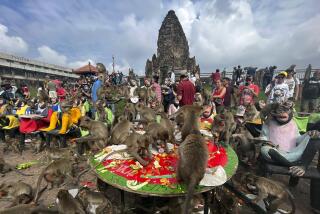Interest Paid in Next Life : Thais Aid Needy, Themselves Through Buffalo Bank
- Share via
BANGKOK, Thailand — At Thailand’s Buffalo Bank loans are made in kind rather than cash, and dividends for investors come in the form of spiritual well-being.
Thousands of poor peasants have borrowed buffaloes, essential beasts of burden, at bargain rates since the bank was founded nine years ago as a charity.
Buffalo meat is popular in Thailand, and most of the bank’s beasts were bred to be eaten. But they were bought from the slaughterhouses and donated to the bank by its patrons.
The donors earn spiritual merit by saving an animal’s life and helping the farmers.
Belief in Reincarnation
Buddhist Thais believe in reincarnation and hold that the merit they earn in this life through good deeds will enhance their status in the next existence.
Like most donors, Chaleo Humphanont, a devout 74-year-old Buddhist, said he preferred to buy female buffaloes for the bank.
“The merit I make will then be passed on in perpetuity, through the calves born from the donated animal,” he said.
This suits the bank, as most farmers prefer to borrow a female buffalo for breeding purposes.
Repayment Plan
Repayment is in the form of the first-born and every second calf after that, said Sanguan Cheunchom, the government official in charge of the bank.
Another donor said that she first bought a buffalo for the bank from a slaughterhouse because she hoped it would prolong her sick father’s life.
“My father didn’t survive, but I’ve continued to donate buffaloes in the hope that by saving an animal’s life I may be reborn again as a human being in my next life,” she said.
Several donors said they preferred saving buffaloes to saving other forms of wildlife.
6,000 Animals in Bank
“Releasing birds or tortoises for merit may be popular with Buddhists, but it only encourages the trade in animal-trapping,” a buffalo donor said.
Master-minded by King Bhumibol Adulyadej, who has set up several projects to help Thai farmers, the bank now has more than 6,000 animals.
It also farms out several hundred cattle originally donated to temples, Sanguan said.
“At one temple the cattle were just left in the fields, and we had to round up them up like cowboys,” Sanguan said. “The abbots didn’t know what to do with them.”
Started by Government
The bank, whose full name is the Royal Buffalo and Cattle Bank, was started with some 200 animals bought by the government but now runs solely on donations from the public, Sanguan said.
The bank charges $28 a year for a plow rather, less than half the rate of commercial operators.
These low rates also help keep farmers out of the hands of loan sharks, whose interest rates can reach 20% a month, trapping many poor farmers in a vicious circle of debt.
“The first thing to go when a farmer is in debt has to be his buffalo, as that is often his only asset other than land,” Sanguan said.
Hire-Purchase Plan
Farmers may also buy animals from the bank on hire-purchase over three years at a cost of about $240 each, the equivalent of a year’s income, she said.
The farmer still has to repay the cost of an animal if it dies from maltreatment, is killed for food or sold off.
Sanguan said that less than 1% of the animals loaned out were abused, because the animals were considered the king’s personal property and therefore had to be treated with care.
“Thais hold the king in such high esteem that anything connected to him is considered almost sacrosanct,” she said.
“Once a stolen buffalo was returned to a farmer after we let it be known that it belonged to the king’s bank.”
Luck and Prosperity
This respect for the king also encourages farmers to work harder, because they believe the animals are lucky and will bring them prosperity, said Tim Bhannasiri, director general of the government’s Livestock Department.
More to Read
Sign up for Essential California
The most important California stories and recommendations in your inbox every morning.
You may occasionally receive promotional content from the Los Angeles Times.













